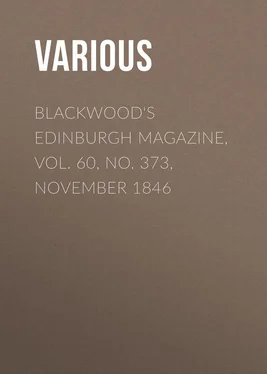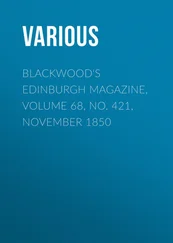Various - Blackwood's Edinburgh Magazine, Vol. 60, No. 373, November 1846
Здесь есть возможность читать онлайн «Various - Blackwood's Edinburgh Magazine, Vol. 60, No. 373, November 1846» — ознакомительный отрывок электронной книги совершенно бесплатно, а после прочтения отрывка купить полную версию. В некоторых случаях можно слушать аудио, скачать через торрент в формате fb2 и присутствует краткое содержание. Издательство: Иностранный паблик, Жанр: periodic, foreign_edu, Путешествия и география, на английском языке. Описание произведения, (предисловие) а так же отзывы посетителей доступны на портале библиотеки ЛибКат.
- Название:Blackwood's Edinburgh Magazine, Vol. 60, No. 373, November 1846
- Автор:
- Издательство:Иностранный паблик
- Жанр:
- Год:неизвестен
- ISBN:нет данных
- Рейтинг книги:5 / 5. Голосов: 1
-
Избранное:Добавить в избранное
- Отзывы:
-
Ваша оценка:
- 100
- 1
- 2
- 3
- 4
- 5
Blackwood's Edinburgh Magazine, Vol. 60, No. 373, November 1846: краткое содержание, описание и аннотация
Предлагаем к чтению аннотацию, описание, краткое содержание или предисловие (зависит от того, что написал сам автор книги «Blackwood's Edinburgh Magazine, Vol. 60, No. 373, November 1846»). Если вы не нашли необходимую информацию о книге — напишите в комментариях, мы постараемся отыскать её.
Blackwood's Edinburgh Magazine, Vol. 60, No. 373, November 1846 — читать онлайн ознакомительный отрывок
Ниже представлен текст книги, разбитый по страницам. Система сохранения места последней прочитанной страницы, позволяет с удобством читать онлайн бесплатно книгу «Blackwood's Edinburgh Magazine, Vol. 60, No. 373, November 1846», без необходимости каждый раз заново искать на чём Вы остановились. Поставьте закладку, и сможете в любой момент перейти на страницу, на которой закончили чтение.
Интервал:
Закладка:
The great object of Louis and his generals had been to construct such a line of defences as might prevent the irruption of the enemy into the French territory, now that the interior and last line of fortresses was so nearly broken through. In pursuance of this design, Villars had, with the aid of all the most experienced engineers in France, and at a vast expense of labour and money, constructed during the winter a series of lines and field-works, exceeding any thing yet seen in modern Europe in magnitude and strength, and to which the still more famous lines of Torres Vedras have alone, in subsequent times, afforded a parallel. The works extended from Namur on the Meuse, by a sort of irregular line, to the coast of Picardy. Running first along the marshy line of the Canche, they rested on the forts of Montreuil, Hesdin, and Trevant; while the great fortresses of Ypres, Calais, Gravelines, and St Omer, lying in their front, and still in the hands of the French, rendered any attempt to approach them both difficult and hazardous. Along the whole of this immense line, extending over so great a variety of ground, for above forty miles, every effort had been made, by joining the resources of art to the defences of nature, to render the position impregnable. The lines were not continuous, as in many places the ground was so rugged, or the obstacles of rocks, precipices, and ravines were so formidable, that it was evidently impossible to overcome them. But where*ever a passage was practicable, the approaches to it were protected in the most formidable manner. If a streamlet ran along the line, it was carefully dammed up, so as to be rendered impassible. Every morass was deepened, by stopping up its drains, or letting in the water of the larger rivers by artificial canals into it; redoubts were placed on the heights, so as to enfilade the plains between them; while in the open country, where no advantage of ground was to be met with, field-works were erected, armed with abundance of heavy cannon. To man these formidable lines, Villars had under his command one hundred and fifty-six battalions, and two hundred and twenty-seven squadrons in the field, containing seventy thousand infantry, and twenty thousand horse. He had ninety field guns and twelve howitzers. There was, besides, thirty-five battalions and eighty squadrons detached or in the forts; and, as Eugene soon took away twelve battalions and fifty squadrons from the Allied army, the forces on the opposite side, when they came to blows, were very nearly equal. 29 29 Lidiard, ii. 426. Coxe, vi. 21. 22.
Marlborough took the field on the 1st May, with eighty thousand men; and his whole force was soon grouped in and around Douay. The headquarters of Villars were at Cambray; but, seeing the forces of his adversary thus accumulated in one point, he made a corresponding concentration, and arranged his whole disposable forces between Bouchain on the right, and Monchy Le Preux on the left. This position of the French marshal, which extended in a concave semicircle with the fortresses, covering either flank, he considered, and with reason, as beyond the reach of attack. The English general was meditating a great enterprise, which should at once deprive the enemy of all his defences, and reduce him to the necessity of fighting a decisive battle, or losing his last frontier fortresses. But he was overwhelmed with gloomy anticipations; he felt his strength sinking under his incessant and protracted fatigues, and knew well he was serving a party who, envious of his fame, were ready only to decry his achievements. 30 30 "I see my Lord Rochester has gone where we all must follow. I believe my journey will be hastened by the many vexations I meet with. I am sure I wish well to my country, and if I could do good, I should think no pains too great; but I find myself decay so very fast, that from my heart and soul I wish the Queen and my country a peace by which I might have the advantage of enjoying a little quiet, which is my greatest ambition." Marlborough to the Duchess , 25th May, 1711. Coxe, vi. 28.
He lay, accordingly, for three weeks awaiting the arrival of his illustrious colleague, Prince Eugene, who joined on the 23d May, and took part in a great celebration of the anniversary of the victory at Ramilies, which had taken place on that day. The plans of the Allied generals were soon formed; and, taking advantage of the enthusiasm excited by that commemoration, and the arrival of so illustrious a warrior, preparations were made for the immediate commencement of active operations. On the 28th, the two generals reviewed the whole army. But their designs were soon interrupted by an event which changed the whole fortune of the campaign. Early in June, Eugene received positive orders to march to Germany, with a considerable part of his troops, to oppose a French force, which was moving towards the Rhine, to influence the approaching election of Emperor. On the 13th June, Eugene and Marlborough separated, for the last time , with the deepest expressions of regret on both sides, and gloomy forebodings of the future. The former marched towards the Rhine with twelve battalions and fifty squadrons, while Marlborough's whole remaining force marched to the right in six divisions. 31 31 Marlborough to St John, 14th June 1711. Disp . v. 428. Coxe, vi. 29, 30.
Though Villars was relieved by the departure of Eugene from a considerable part of the force opposed to him, and he naturally felt desirous of now measuring his strength with his great antagonist in a decisive affair, yet he was restrained from hazarding a general engagement. Louis, trusting to the progress of the Tory intrigues in England, and daily expecting to see Marlborough and the war-party overthrown, sent him positive orders not to fight; and soon after detached twenty-five battalions and forty squadrons, in two divisions, to the Upper Rhine, to watch the movements of Eugene. Villars encouraged this separation, representing that the strength of his position was such, that he could afford to send a third detachment to the Upper Rhine, if it was thought proper. Marlborough, therefore, in vain offered battle, and drew up his army in the plain of Lens for that purpose. Villars cautiously remained on the defensive; and, though he threw eighteen bridges over the Scarpe, and made a show of intending to fight, he cautiously abstained from any steps which might bring on a general battle. 32 32 Villars' Mem. tom. ii. ann. 1711.
It was not without good reason that Louis thus enjoined his lieutenant to avoid compromising his army. The progress of the negotiations with England gave him the fairest ground for believing that he would obtain nearly all he desired from the favour with which he was regarded by the British cabinet without running any risk. He had commenced a separate negotiation with the court of St James's, which had been favourably received; and Mr Secretary St John had already transmitted to Lord Raby, the new plenipotentiary at the Hague, a sketch of six preliminary articles proposed by the French king, which were to be the basis of a general peace. 33 33 Bolingbroke's Corresp. i. 172.
The high tone of these proposals proved how largely Louis counted upon the altered dispositions of the British cabinet. The Spanish succession, the real object of the war, was evaded. Every thing was directed to British objects, and influenced by the desire to tempt the commercial cupidity of England to the abandonment of the great objects of her national policy. Real security was tendered to the British commerce with Spain, the Indus, and the Mediterranean; the barrier the Dutch had so long contended for was agreed to; a reasonable satisfaction was tendered to the allies of England and Holland; and, as to the Spanish succession, it was to be left to "new expedients, to the satisfaction of all parties interested." These proposals were favourably received by the British ministry; they were in secret communicated to the Pensionary Heinsius, but concealed from the Austrian and Piedmontese plenipotentiaries; and they were not communicated to Marlborough – a decisive proof both of the altered feeling of the cabinet towards that general, and of the consciousness on their part of the tortuous path on which they were now entering. 34 34 "The Duke of Marlborough has no communication from home on this affair; I suppose he will have none from the Hague." Mr Secretary St John to Lord Raby , 27th April 1711. Bolingbroke's Corresp. i. 175.
Интервал:
Закладка:
Похожие книги на «Blackwood's Edinburgh Magazine, Vol. 60, No. 373, November 1846»
Представляем Вашему вниманию похожие книги на «Blackwood's Edinburgh Magazine, Vol. 60, No. 373, November 1846» списком для выбора. Мы отобрали схожую по названию и смыслу литературу в надежде предоставить читателям больше вариантов отыскать новые, интересные, ещё непрочитанные произведения.
Обсуждение, отзывы о книге «Blackwood's Edinburgh Magazine, Vol. 60, No. 373, November 1846» и просто собственные мнения читателей. Оставьте ваши комментарии, напишите, что Вы думаете о произведении, его смысле или главных героях. Укажите что конкретно понравилось, а что нет, и почему Вы так считаете.












